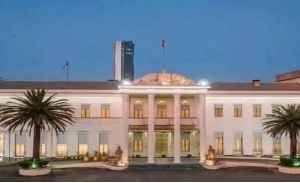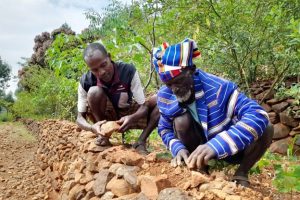
Nestled in the heart of Ethiopia’s Rift Valley, the town of Batu, formally known by Ziway, is rapidly emerging as a top tourist destination, drawing both local and international visitors with its unique blend of natural beauty, rich biodiversity, and cultural vibrancy. Located just 163 kilometers south of Addis Ababa, Batu’s strategic location and eco-tourism potential make it a rising gem in Ethiopia’s growing travel landscape.
Accordingly, Batu is best known for its lake Batu, one of Ethiopia’s famous Rift Valley lakes, which serves as a centerpiece for tourism in the area. The lake, dotted with five volcanic islands, offers scenic views, tranquil boat rides, and bird watching opportunities that are second to none. A haven for ornithologists and nature lovers, Lake Batu is home to over 200 species of birds including pelicans, storks, herons, and the majestic African fish eagle.
The lake also supports a vibrant fishing community, making it a cultural hub of activity. Visitors can engage with local fishermen, witness traditional fishing practices, and sample freshly caught tilapia prepared in local style. Most of the lake’s islands hold historical and religious significance as the reputed place of the Ethiopian Orthodox Tewahido Church Monastery.
Beyond the lake, Batu’s landscape offers fertile ground for adventure tourism. The surrounding environment features lush farmlands, acacia woodlands, and picturesque savannahs, ideal for hiking, biking, and wildlife excursions. The area’s biodiversity includes hippos, monkeys, and numerous amphibians and reptiles, contributing to its status as an ecological treasure.
Thanks to continuous infrastructure improvements and the development of new tourist attractions, Batu town has emerged as one of Ethiopia’s leading destinations for conference and leisure tourism.
Batu Town Administration Mayor Ahmedin Ismail told the Ethiopian Press Agency (EPA) that the town has undergone a remarkable transformation in recent years, becoming a major hub for domestic tourism.
According to the Mayor, tourist inflow to the city has steadily increased year after year.
“In 2023, Batu generated 300 million Birr from tourism. This figure rose to 654 million Birr in 2024. In the current fiscal year, revenue from tourism has already surpassed 1.1 billion Birr,” he stated.
Looking ahead, the Administration aims to generate over 1.8 billion Birr from the tourism sector in the coming year.
To achieve this, various initiatives are being implemented in the town, including corridor development, the Lake Batu Development project, and efforts to ensure the availability of standardized hotels and resorts, as well as to maintain sustainable peace and security.
Mayor Ahmedin emphasized that the Town Administration recognizes the tourism sector as a key contributor to Batu’s economic growth. As a result, a number of strategies have been introduced to enhance the town’s appeal, including urban beautification and cleanliness improvement programs.
Tourism has also become a major investment sector in Batu, with increasing opportunities in hotels, resorts, and other service-oriented businesses proving to be profitable ventures.
The Mayor further highlighted Batu’s distinctive offerings, including its rich fish harvest, fresh fruit and vegetable supply to the national market, and the popular annual Lake Batu Timket Festival, which continues to attract both domestic and international visitors.
Thus, the town is undertaking massive investments in the tourism sector and striving to provide luxurious touristic services for tourists.
More importantly, the Abijatta-Shalla Lakes National Park, just a short drive from Batu, expands the town’s appeal. The park is renowned for its alkaline lakes, flamingos, hot springs, and panoramic volcanic formations. Tourists can explore the park on guided tours while learning about ongoing conservation efforts.
The Abijatta-Shalla Lakes National Park is located approximately 200 kilometers (124 miles) south of Addis Ababa, within the Great Rift Valley. It is situated east of the Batu–Shashamane highway. The park is centered by the two alkaline lakes, Abijatta and Shalla, separated by a three-kilometer strip of hilly land. The park encompasses an area of more than 800 square kilometers.

In recent years, Batu has seen notable improvements in infrastructure, hospitality services, and community-based tourism. New lodges and eco-resorts now line the lake’s shore, offering sustainable accommodations with stunning lakefront views. The local government and private investors have been working in tandem to improve roads, expand tourism services, and train young people in tourism and hospitality.
Moreover, the annual Timket Festival (Ethiopian Epiphany) is garnering popularity, showcasing the town’s rich cultural assets through music, dance, food, and crafts. This celebration not only reinforces community pride but also attracts tourists seeking authentic cultural experiences.
Batu’s rise as a tourist destination reflects Ethiopia’s broader push to diversify its tourism offerings beyond historical sites like Lalibela and Axum. The town’s leadership is committed to sustainable tourism development, with an emphasis on environmental protection, community participation, and heritage preservation.
What is more, initiating sustainable environmental conservation and community tourism projects that empower women, promote eco-friendly businesses, and protect the lake’s delicate ecosystem is significantly contributing to boost Batu’s tourism. These initiatives ensure that Batu’s development benefits both residents and visitors while safeguarding its natural and cultural assets.
In sum, Batu’s transformation from a quiet lakeside town to a dynamic tourism hub is a testament to Ethiopia’s untapped potential in eco- and cultural tourism. With continued investment, careful planning, and community engagement, Batu is poised to become one of the country’s premier destinations offering travelers an unforgettable blend of nature, culture, and hospitality. As Ethiopia continues to unlock its diverse tourism treasures, Batu stands as a shining example of what thoughtful, inclusive tourism development can achieve.
BY TEWODROS KASSA
THE ETHIOPIAN HERALD FRIDAY 11 JULY 2025





